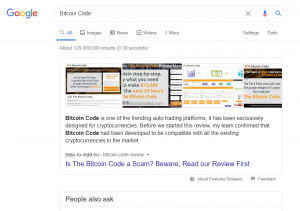
Marko Milic, a spokesman to the Croatian government, has confirmed he will file a police report about a fraudulent Bitcoin-related website targeting unsuspecting victims.
Although not the first of its kind in the industry, the scheme dubbed “Bitcoin Code” impersonates Croatian Prime Minister, Andrej Plenković, promising to pay out tens of thousands of Euros to investors within a day after their initial investment.
The persons behind the scheme are running paid ads on Facebook using a page that is unrelated to cryptocurrencies.
The post has the title “SPECIAL REPORT: Andrej Plenković’s latest investment terrified experts in strong and large banks,” and tells an untrue story about how the Croatian Prime Minister has amassed a great deal of wealth from investing in Bitcoin.
There is also a call to action quoted the Croatian Prime Minister as calling the “Bitcoin Code” scam “the fastest way to make a lot of money right now,” urging unsuspecting persons to invest before “a lot of people find out about it. Or after the banks stop it forever.”
Spokesman Marko Milic told a local news agency, Faktograph, regarding the latest fraud attempt:
The Prime Minister has nothing to do with these announcements on social networks and we urge citizens not to fall prey to such frauds. We will report this case to the competent MUP services, which will continue to act in accordance with the law.
Bitcoin Code Review
Although it is apparent that the “Bitcoin Code” scheme is an outright attempt to defraud investors, the persons behind the scheme has obfuscated it by dominating search engine results for the keywords, Bitcoin Code and Bitcoin Code review.
A Google search shows several paid reviews on popular websites, misleading investors to believe that the scheme isn’t fraudulent.

Worse still, clicking on links from the paid Bitcoin Code review websites reverts the user to a cryptocurrency brokerage website, often dependent on the location of the visitor. That would suggest that brokers are using the “Bitcoin Code” and similar websites to attract new customers to their platform.
Either way, the impersonation of Croatia’s Prime minister and the recent Bitcoin-related Twitter hack are among some of the factors shaping the mainstream perception of the cryptocurrencies in the wrong direction.


